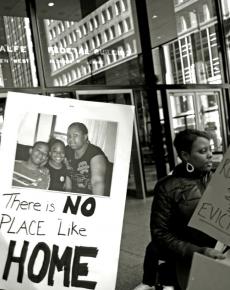A Chicago victory over eviction
tells how an activist campaign helped prevent a Chicago family grieving the loss of a loved one from being thrown out of their home.
A CHICAGO family threatened with an unfair eviction is celebrating after community members rallied to their defense and forced housing authorities to intervene on their behalf.
Rosetta Bledsoe had been taking care of three of her grandchildren--De'Ajah (age 14), Ty'Juan (age 12) and Ja'Kalah (age 9)--for most of their lives in their apartment in the Rogers Park neighborhood on the north side of Chicago. However, when she became ill with lung disease last year, the children's aunt, Erica Bledsoe (who is also Rosetta's daughter), moved in to help take care of them and Rosetta. When Rosetta died unexpectedly shortly afterward, Erica again stepped up and gained legal guardianship of the kids.
But within six weeks--as Erica was in the throes of trying to deal with her and the kids' grief, as well as maintain a stable home for them--Erica received a notice of eviction from Northpoint, the corporation that owns the subsidized housing in which they live.
Northpoint stated that the eviction action was against "Erica Bledsoe and unknown occupants," even though the kids' names were on the lease. A family that had already suffered so much was under threat of losing its home and the neighborhood where the children had grown up, gone to school and made friends. They didn't have other options and faced possible homelessness.

At this point, Erica enlisted the services of Matt Monahan and Nicki Bazer, two lawyers from the nonprofit Legal Assistance Foundation--and got word out to the community.
In July, a vigil was called to show support for Erica and the kids, as well as to knit together community activists such as Frank Edwards, a community organizer; Megan Cottrell, who writes a public housing blog called "One Story Up" on ChicagoNow.com; the group Northside Action for Justice; and the International Socialist Organization.
When a court date for a summary judgment was set for October 8, this group met in Erica's living room and formed an action coalition.
As we participated in that meeting, the injustice of the whole situation was brought home to me when Erica interrupted our conversation to call out to one of the kids, "Are you doing your homework?" Here was a young woman taking responsibility for the care of three young family members, trying to keep them focused on their schoolwork--and all the while the capriciousness of a corporation was threatening to tear away their home.
The action coalition started a campaign of gathering online and postcard petition signatures, canvassing the neighborhood and el stops, contacting media organizations, and organizing phone calls and e-mails to the Department of Housing and Urban Development (HUD) and the Illinois Housing Development Agency--the two agencies the control the federal funds Northpoint receives. That money, it might be added, was being using to pay private lawyers to try to evict the family.
The petition-gathering and canvassing actions garnered resistance and harassment from private security companies employed by both the Chicago Transit Authority and Northpoint.
During one canvassing action, ISO activists confronted Joe Moore, the alderman for this area of Chicago (the 49th ward) and one of the most prominent liberal politicians in the city, for his anemic response to this travesty of justice. When he kept insisting that it wasn't his role to intervene or even investigate situations such as this, we reminded him that Jan Schakowsky, the local Congresswoman, had taken a different approach, writing a strong letter of support for the family to HUD.
At this point, Moore said that there were "two sides to every story," and that he had heard from Northpoint that there were "possible illegal activities" going on in the apartment. When pressed, he admitted there was no evidence for these accusations floated by one of the interested parties in the case, but evidently, the mention of "possible illegal activities" in association with a subsidized housing recipient was enough for him to take a posture of political apathy.
THE PROTESTS were to culminate in a demonstration scheduled for Noon on October 5 at the Federal Building in downtown Chicago, where HUD has its regional offices. After months of pointing fingers and doing nothing, suddenly that morning, the relevant federal bureaucracies found their pens and instructed Northpoint to resolve the case favorably for the Bledsoe family.
To call attention to this positive development, the demonstration was changed to become more of a press conference and rally. About 25 enthusiastic supporters showed up, along with a dozen members of the media. Before a contingent could go up to the HUD offices, the agency sent a representative down to receive the more than 600 postcard petitions signed in support of the family.
At this point, Erica has signed a new lease in her name, and the children are no longer being referred to as "unknown occupants."
Now, Erica says, she and the kids can finally grieve the loss of Rosetta and get on with their lives. With the children once again having a settled place to live--and the stable community and school relations that come with that--Erica hopes to go back to school to finish getting her barber's license, a process she put on hold in order to take care of the children and fight this legal battle to protect their right to have a home.
Despite the heartlessness of housing corporations, the harassment of security companies, and the apathy of politicians and government agencies, when people organize and fight back against a system that profits off basic human needs, things can begin to change--and people can realize their power and catch a glimpse of a society where housing is a right and children are not threatened with homelessness.


